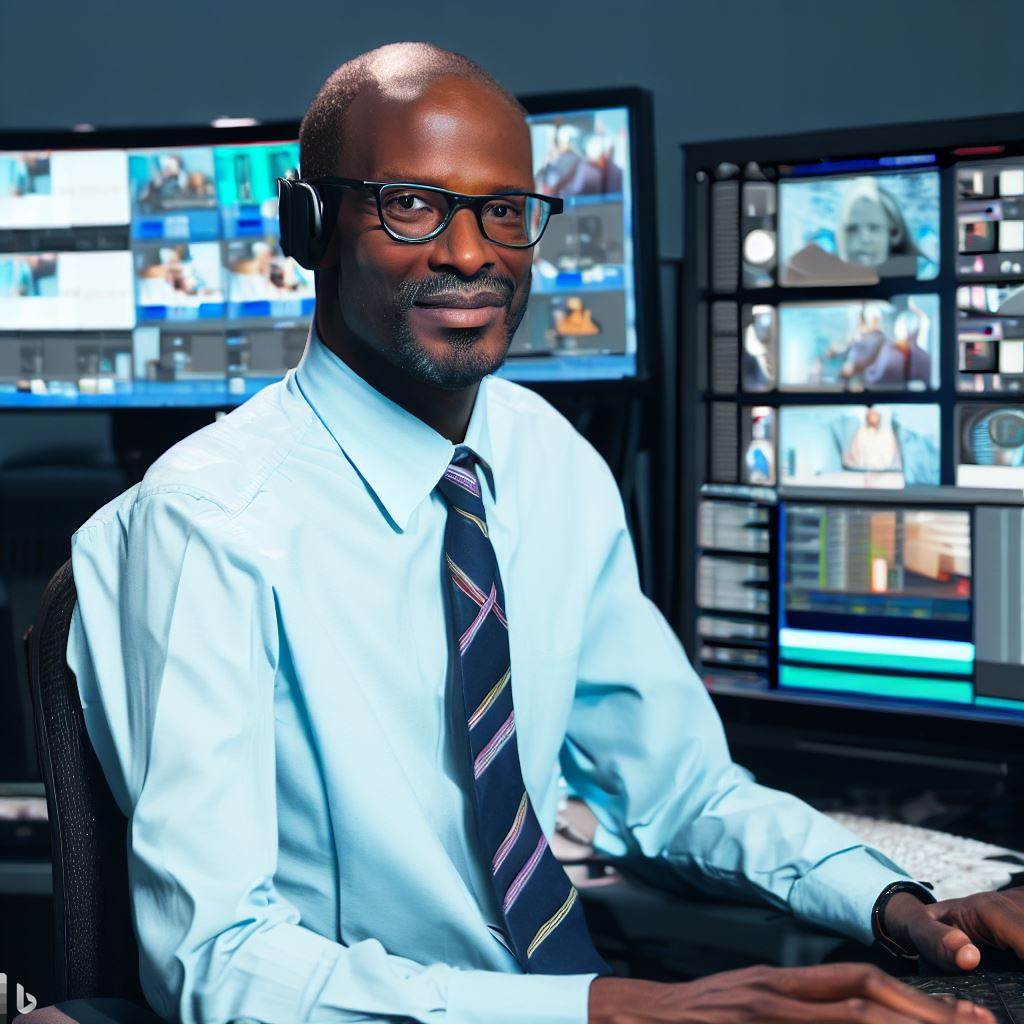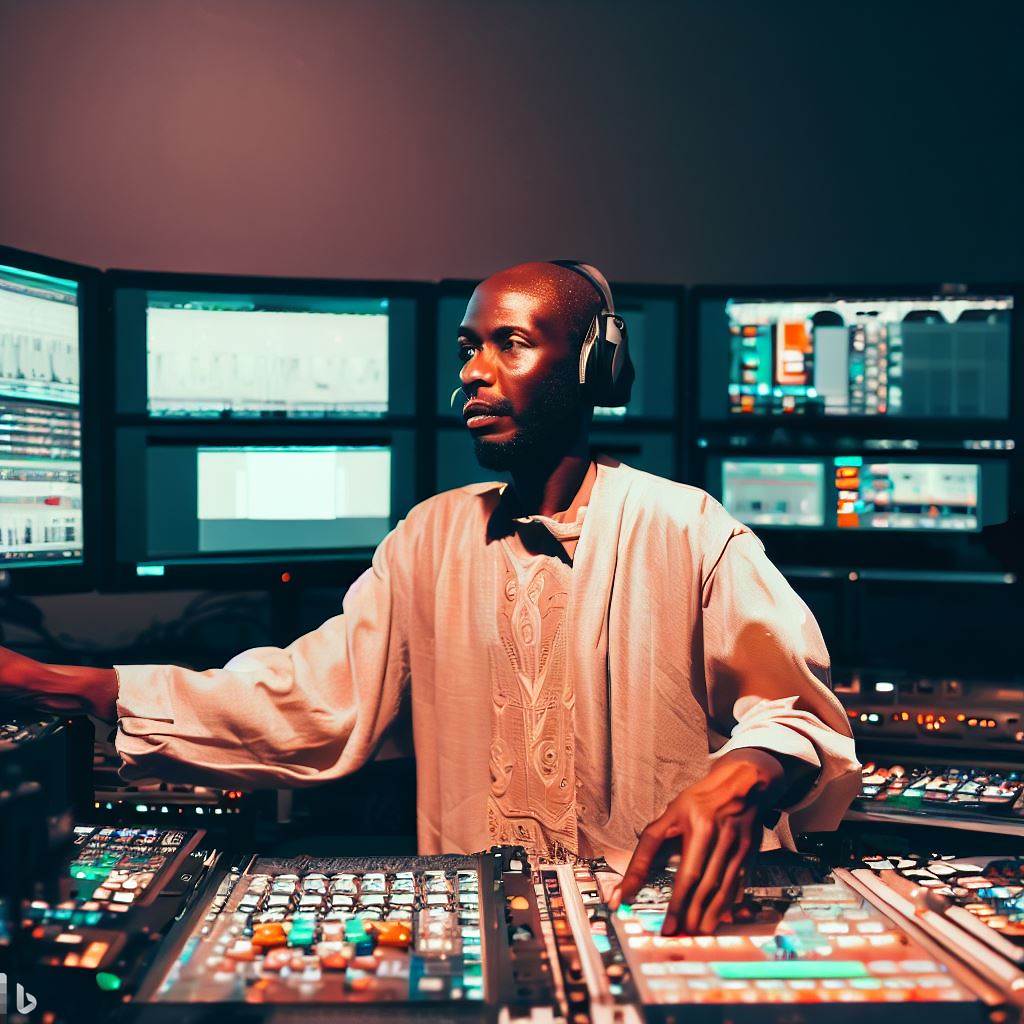Introduction
Television editing in Nigeria is currently facing numerous challenges.
The industry is struggling to meet the demands of modern viewers.
With limited resources and outdated technology, television editors in Nigeria find it difficult to produce high-quality content.
However, rapid advancements in technology have the potential to revolutionize television editing in Nigeria.
The rise of digital platforms, online streaming services, and affordable editing software provide opportunities for growth and innovation.
These technologies enable faster and more efficient editing processes, allowing editors to enhance the viewing experience.
The impact of technology on television editing in Nigeria cannot be overstated. High-speed internet and mobile devices have changed the way Nigerians consume television content.
Viewers now have access to a wide range of programming options from around the world.
This increased demand for diverse and engaging content puts pressure on television editors to adapt and improve their editing techniques.
Basically, the future of television editing in Nigeria holds promise and potential.
As technology continues to advance, the industry must embrace change and adopt new editing techniques.
This blog post will explore the possible changes that may occur in television editing in Nigeria, providing insights into the future of the industry.
Stay tuned for the upcoming sections, where we will delve deeper into the advancements and challenges that lie ahead.
Growing Demand for High-Quality Content
A. Increasing demand for high-quality television content in Nigeria
- Television viewers in Nigeria are becoming more discerning and expect better quality content.
- With the rise of streaming platforms, there is a need for content that can compete internationally.
- Nigerian television shows are gaining popularity globally, leading to a higher demand for quality.
B. How this demand has led to more opportunities for skilled television editors
- Television production companies are looking for editors who can enhance the overall quality of their content.
- Skilled editors can bring out the best in the raw footage, ensuring a polished final product.
- The demand for skilled television editors has created job opportunities and growth in the industry.
C. Importance of television editing in creating engaging content
- Television editing plays a crucial role in shaping the narrative and pacing of a show.
- It helps to maintain viewer interest by eliminating unnecessary scenes and keeping the story engaging.
- Skilled editing can enhance emotional impact, create suspense, and build tension in television shows.
- Television editing ensures seamless transitions between scenes, maintaining the flow of the story.
- It allows for the incorporation of visual effects and other post-production techniques to enhance the viewing experience.
The future of television editing in Nigeria looks promising with the increasing demand for high-quality content.
Nigerian viewers are becoming more discerning, expecting better production values and engaging stories.
This rising demand has opened up new opportunities for skilled television editors who can enhance the overall quality of shows.
The importance of television editing cannot be underestimated, as it plays a crucial role in creating engaging content.
Editors have the power to shape the narrative, maintain viewer interest, and enhance emotional impact.
They ensure seamless transitions between scenes and incorporate post-production techniques to enhance the viewing experience.
As Nigerian television shows gain popularity globally, the need for skilled editors will only continue to grow.
These editors will be the driving force behind the success of Nigerian television content both locally and internationally.
Advancements in Editing Software and Tools
In recent years, there has been a significant rise in the availability and popularity of advanced editing software in the global market.
These software tools have revolutionized the way television editing is done, offering a wide range of features and capabilities.
A. The rise of advanced editing software in the global market
With the advent of non-linear editing systems, editors now have greater control over the editing process.
They can easily manipulate footage, add effects, and make changes without the need for physical tape reels.
This has greatly improved the efficiency and speed of editing, allowing for quicker turnarounds and more creative freedom.
One of the most significant impacts of these editing tools is the ability to work with high-resolution footage.
With the rise of digital cameras and the availability of 4K and even 8K resolution footage, editors need software that can handle these large files without compromising on performance.
Advanced editing software provides the necessary processing power and storage capabilities to handle such demanding workflows.
B. The impact of these tools on television editing workflows
Furthermore, these tools offer a vast array of effects and transitions that can enhance the storytelling and visual appeal of television shows.
Editors can easily add graphics, text, and animations to create a more immersive viewing experience.
This has become particularly important in the age of streaming services, where television shows are competing for the audience’s attention.
C. How Nigerian editors are adapting to these new technologies
In Nigeria, television editors are also adapting to these new technologies.
They are embracing advanced editing software to improve their workflow and deliver high-quality content.
The availability of these tools has opened up new opportunities for Nigerian editors, allowing them to experiment with different editing styles and techniques.
One of the most significant impacts of these editing tools is the ability to work with high-resolution footage.
With the rise of digital cameras and the availability of 4K and even 8K resolution footage, editors need software that can handle these large files without compromising on performance.
Advanced editing software provides the necessary processing power and storage capabilities to handle such demanding workflows.
Challenges faced on the adoption of new technologies
However, there are still challenges that Nigerian editors face when it comes to adopting these new technologies.
Cost of editing software
One major hurdle is the cost of acquiring these advanced editing software and tools.
They are often expensive and require significant investments, which may be prohibitive for many Nigerian editors working on a tight budget.
Lack of training and education on these software tools
Another challenge is the lack of training and education on these software tools.
While some Nigerian editors may have access to the necessary software, they may not have the proper knowledge and skills to fully utilize its capabilities.
This highlights the need for training programs and workshops that can help Nigerian editors stay updated with the latest advancements in editing software.
Despite these challenges, the future of television editing in Nigeria looks promising.
As technology continues to advance, it is expected that editing software and tools will become more affordable and accessible.
With proper training and support, Nigerian editors will be able to fully embrace these advancements and take their craft to new heights.
Generally, the rise of advanced editing software in the global market has had a significant impact on television editing workflows.
These tools have improved efficiency, enhanced creativity, and allowed for the handling of high-resolution footage.
Nigerian editors are slowly adapting to these technologies, but more support and training are needed to fully capitalize on their potential.
Read: Educational Background of Top TV Editors in Nigeria
Embracing Remote Editing
A. COVID-19 pandemic and its impact on television production
The COVID-19 pandemic has truly transformed the landscape of television editing in Nigeria.
The restrictions imposed to control the spread of the virus have disrupted traditional editing processes, leaving the industry grappling for solutions.
However, remote editing has emerged as a necessary practice to ensure the continuity of television production.
- The COVID-19 pandemic has caused unprecedented disruptions in the television production industry in Nigeria.
- Lockdowns and social distancing measures have halted traditional on-site editing processes.
- Production crews have been unable to gather in editing rooms, compromising the continuity of television shows.
- The pandemic has forced television networks and production companies to explore alternative solutions.
B. How remote editing has become a necessity to ensure continuity
- Remote editing has emerged as a vital solution to continue television production amidst the pandemic.
- Edit teams can work from home or separate locations, reducing the risk of virus transmission.
- Remote editing allows for the seamless collaboration of editors and other post-production professionals.
- It ensures the timely delivery of television content, meeting viewers’ expectations even during uncertain times.
C. Benefits and challenges of remote editing in Nigeria’s television industry
Benefits
- Remote editing provides flexibility, allowing editors to work at their preferred hours, boosting productivity.
- Transparency and efficiency are increased as edits can be easily tracked and monitored online.
- It reduces production costs by eliminating the need for physical editing rooms and associated expenses.
- Remote editing opens up opportunities for talent collaboration across different regions and even internationally.
- With remote editing, television production can continue regardless of external factors, ensuring uninterrupted programming.
1. Flexibility for Editors
The benefits of remote editing in Nigeria’s television industry are plenty.
First and foremost, it provides flexibility for editors, allowing them to work from the comfort of their homes or preferred locations.
This flexibility results in increased productivity and job satisfaction.
Additionally, remote editing offers the advantage of transparency and efficiency, as edits can be easily tracked and monitored online.
This ensures a smooth workflow and timely delivery of television content.
2. Reduction in production cost
Moreover, remote editing significantly reduces production costs.
Physical editing rooms become unnecessary, leading to savings in real estate rentals and equipment maintenance.
This cost reduction is especially crucial for smaller television production entities operating on tighter budgets.
Additionally, remote editing opens up opportunities for collaboration among talents across different regions and internationally.
The industry can now tap into a diverse pool of creativity, resulting in innovative and high-quality television content.
3. Enables resilience
Furthermore, remote editing enables the resilience of Nigeria’s television industry during challenging times.
Whether facing a pandemic, natural disaster, or other external factors, television production can continue without significant disruptions.
Viewers can enjoy uninterrupted programming, providing a sense of normalcy and entertainment.
Challenges
- Infrastructure limitations such as unreliable internet connectivity can hinder the effectiveness of remote editing.
- Security of confidential television content may be compromised during remote editing.
- Initial setup costs and technology requirements could be challenging for some television production entities.
- Effective communication and collaboration between remote team members might pose challenges and require adaptation.
- Training editors on the technical aspects of remote editing can be time-consuming and resource-intensive.
1. Infrastructure limitations
However, remote editing also poses certain challenges.
Infrastructure limitations, such as unreliable internet connectivity, can impede the effectiveness of remote editing.
To address this issue, investments in improving internet infrastructure in Nigeria will be vital.
Another concern is the security of confidential television content during remote editing.
Robust cybersecurity measures must be implemented to safeguard against unauthorized access or leaks.
2. Initial setup costs and technology requirements
Additionally, the initial setup costs and technology requirements for remote editing might be challenging for some television production entities, particularly smaller ones with limited resources.
This hurdle can be overcome through government support or partnerships with technology companies.
Effective communication and collaboration between remote team members can also be a challenge, requiring adjustments and the use of appropriate communication tools.
Training editors on the technical aspects of remote editing is another consideration.
It is necessary to equip editors with the appropriate skills and knowledge to maximize the benefits of remote editing fully.
Investment in training programs and workshops can ensure a smooth transition.
Essentially, the COVID-19 pandemic has forced Nigeria’s television industry to embrace remote editing to ensure continuity.
While it brings numerous benefits such as flexibility, cost reduction, and resilience, challenges exist.
By addressing infrastructure limitations, strengthening cybersecurity measures, providing necessary resources, and promoting training programs, Nigeria’s television industry can leverage remote editing to shape the future of television post-production.
Read: The Role of Public Relations Specialists in Nigeria Today

Automation and Artificial Intelligence in Television Editing
A. The emergence of automation and AI technologies in editing processes
Automation and AI technologies have revolutionized television editing by streamlining repetitive tasks and enhancing the precision of the editing process.
The emergence of automation and AI technologies has significantly impacted the field of television editing.
These technologies utilize sophisticated algorithms and machine learning to automate tasks such as color correction, audio level adjustment, and video stabilization.
By automating these previously time-consuming and manual processes, television editors can focus more on the creative aspects of their work.
AI algorithms are trained on vast amounts of data, enabling them to recognize patterns and make intelligent decisions.
Publish Your Professional Profile, Business or Brand
Showcase your expertise, gain trust, and boost visibility instantly on Professions.ng.
Publish NowThis enables editors to automate the identification and categorization of footage, saving them valuable time in the sorting and organizing process.
In addition, AI can generate metadata tags based on content analysis, making it easier to search for specific shots or scenes.
AI technologies can also analyze audience preferences and optimize video content based on viewers’ interests and engagement patterns.
With the emergence of automation and AI, television editors can work more efficiently, ensuring faster turnaround times for projects.
B. How these technologies can enhance efficiency and speed in television editing
Automation and AI technologies offer numerous benefits to television editing, including increased efficiency and speed.
These technologies enable the automation of repetitive tasks, allowing editors to work more efficiently and improve productivity.
AI algorithms can analyze audio tracks and automatically sync them with video footage, eliminating the need for manual alignment.
Additionally, AI-powered tools can identify continuity errors, such as jump cuts or mismatched audio, and provide suggestions for seamless transitions.
Automation and AI can intelligently analyze and select the best shots from a pool of footage, making the editing process faster and more precise.
These technologies can also enhance the collaboration process by enabling real-time feedback and remote editing capabilities.
Cloud-based platforms powered by automation and AI allow editors to access and edit projects from anywhere, promoting flexibility and efficiency.
Overall, the integration of automation and AI technologies in television editing can significantly enhance efficiency and speed in the post-production workflow.
C. The potential implications for Nigerian television editors and the need to adapt
The adoption of automation and AI technologies in television editing presents both opportunities and challenges for Nigerian editors.
On one hand, these technologies can improve productivity and create new job opportunities requiring technical expertise in utilizing automation and AI tools.
However, it also raises concerns about the future of traditional editing jobs and the need for Nigerian editors to upskill themselves.
Nigerian television editors must adapt to the changing landscape by familiarizing themselves with automation and AI technologies.
Training programs, workshops, and courses should be made available to Nigerian editors to learn how to effectively utilize these technologies.
Embracing automation and AI tools can position Nigerian television editors for success and ensure their relevance in the industry.
Collaboration between industry professionals and technology experts can facilitate knowledge-sharing and support the transition to automated editing processes.
Furthermore, Nigerian editors should focus on refining their creative skills and storytelling abilities, which cannot be replaced by automation.
The key lies in striking a balance between automation and human creativity to deliver high-quality content that resonates with audiences.
In general, the emergence of automation and AI technologies in television editing offers immense potential for efficiency and speed.
Nigerian television editors must adapt and embrace these technologies to remain competitive in a rapidly evolving industry.
Read: Comparison: TV Editor Roles in Nigeria Vs. Globally
Find Out More: TV Editor’s Guide: Best Tools for Editing in Nigeria
New Editing Techniques and Creative Approaches
A. Importance of Staying Innovative in Television Editing
Staying innovative in television editing is crucial for numerous reasons:
- Keeps the audience engaged and interested in the content being presented.
- Allows for the exploration of new storytelling techniques to captivate viewers.
- Enables the creation of fresh and unique narratives that stand out from the competition.
- Helps maintain the relevance of television editing in the rapidly evolving media landscape.
- Encourages continuous improvement and growth within the editing industry.
B. New Editing Techniques and Creative Approaches Used Globally
The global editing industry has witnessed the emergence of several groundbreaking techniques:
- Montage Editing: This technique involves the rapid succession of images to convey information or evoke emotions effectively.
- Parallel Editing: Also known as cross-cutting, it allows the interweaving of multiple storylines, heightening suspense and tension.
- Non-Linear Editing: Offering greater flexibility, it allows editors to rearrange and manipulate footage easily.
- Green Screen: Widely used in creating visually stunning visual effects by replacing the green background with various elements.
- Time Remapping: Altering the speed and duration of clips to create dramatic or comedic effects.
C. Influence of These Trends on the Future of Television Editing in Nigeria
The impact of these new techniques and creative approaches cannot be overlooked in Nigeria’s television editing industry:
- Expanded Possibilities: Nigerian editors can explore unique storytelling methods, pushing the boundaries of creativity in television.
- Enhanced Visual Effects: Incorporating cutting-edge techniques enables Nigerian editors to compete on a global scale.
- Broadened Audience Appeal: Innovative editing techniques can attract a more diverse range of viewers, expanding the industry’s reach.
- Increased Professional Growth: Mastery of these techniques allows editors to become sought-after professionals in the global market.
- Integration of Nigerian Culture: By incorporating local elements, Nigerian editors can create distinct and authentic storytelling experiences.
- Improved Storytelling: These techniques open avenues for more impactful narratives, evoking stronger emotions from the audience.
- Competitive Advantage: Embracing new editing techniques positions Nigeria’s industry as a leader in the African television market.
By staying innovative and adopting these global trends, the future of television editing in Nigeria looks promising.
These techniques not only enable Nigerian editors to create visually captivating content but also bring African stories to a global stage.
As technology continues to advance and creative approaches evolve, it is essential for Nigerian editors to embrace these changes wholeheartedly and further elevate the art of television editing.
Read: Building Networks: An Essential for TV Reporters in Nigeria
Collaboration and Networking in the Industry
A. The importance of collaboration and networking among television editors
- Collaboration and networking play a crucial role in the growth and success of television editors in Nigeria.
- By collaborating with other editors, they can learn new techniques and improve their skills.
- Networking allows editors to build connections with industry professionals and potential clients.
- It promotes a sense of community among editors, fostering an environment of support and camaraderie.
- Collaboration and networking also help editors stay updated on industry trends and technologies.
B. How Nigerian editors can benefit from networking opportunities
- Networking events provide a platform for editors to showcase their work and gain exposure.
- They can meet potential clients, producers, and directors who may hire their services.
- Networking opens doors for collaboration on projects, expanding their portfolio and experience.
- Editors can also learn from the experiences and successes of more established editors in the industry.
- Through networking, they can stay informed about job opportunities and industry developments.
C. Potential for international collaborations in television editing
- Television editing is not limited to Nigeria; there are opportunities for collaborations internationally.
- Nigerian editors can collaborate with editors from other countries, sharing expertise and cultural perspectives.
- International collaborations introduce Nigerian editors to a global audience, increasing their visibility.
- They can gain insights into different television markets and expand their professional network abroad.
- International collaborations enhance the diversity and creativity in television editing, fostering innovation.
Conclusion
This blog post discussed the future of television editing in Nigeria.
It emphasized the need for Nigerian television editors to adapt to future changes in order to stay relevant in the industry.
Despite the challenges, there is optimism about the future of television editing in Nigeria and its potential impact on the overall industry.




